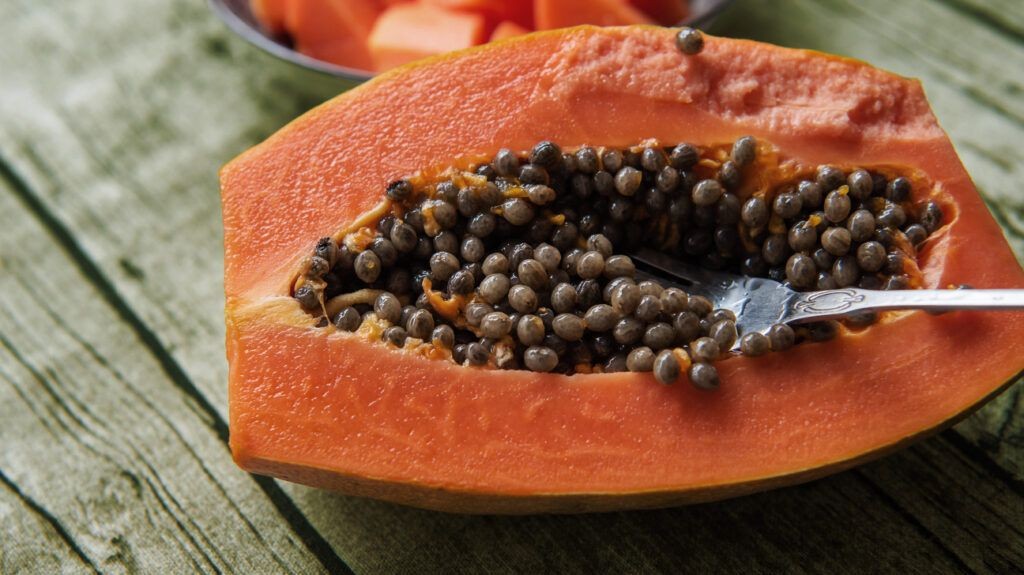Papaya, a tropical fruit known for its vibrant orange flesh and sweet flavor, is more than just a delicious treat. Its rich nutritional profile offers a variety of potential health benefits. Let’s delve into the many ways papaya can contribute to your overall well-being.
Vision and Eye Health
Papaya is packed with nutrients that may play a role in maintaining healthy vision. Specific organic compounds, including lycopene, can combat inflammation and oxidative stress associated with age-related eye conditions like macular degeneration. Lycopene may safeguard the retinal pigment epithelium, essential for healthy vision, against these damaging factors.
Furthermore, the carotene content, responsible for papaya’s distinctive orange hue, is linked to improved vision and prevention of night blindness. Zeaxanthin, a powerful antioxidant found in papaya, acts as a filter against harmful blue light rays, potentially protecting against macular degeneration and promoting overall eye health.
Potential Relief from Asthma
Studies suggest that a diet abundant in fruits and vegetables, including papaya, can lower the risk of developing asthma and alleviate its symptoms. This protective effect is attributed to dietary components like antioxidants, fiber, and vitamin D, which support the immune system’s proper function and prevent over-response in individuals with asthma.
A 2022 study correlated a higher intake of carotenes, lycopene, and zeaxanthin with a reduced risk of asthma in adults. Papaya naturally provides all three of these beneficial compounds. Additionally, a 2017 animal study demonstrated that papaya leaf extract exhibited anti-inflammatory properties in the airways of mice. While promising, further research is needed to confirm the effects of papaya leaf extract on humans.
Cancer-Fighting Properties
Papaya contains several compounds, such as lycopene, zeaxanthin, and lutein, that may have anticancer effects. A 2022 review highlights studies demonstrating lycopene’s anticancer properties, particularly against prostate cancer, although further research is necessary to determine optimal dosages.
A 2020 study indicates that zeaxanthin may have a beneficial effect on gastric cancer cells. Furthermore, a 2018 study found that lutein selectively slows the growth of breast cancer cells.
More broadly, incorporating a diet rich in fruits and vegetables like papaya can help reduce the overall risk of cancer. Plants with vibrant colors, such as papaya, generally possess the highest concentration of beneficial nutrients.
Strengthening Bone Health
Papaya is a valuable source of vitamin K, a nutrient crucial for bone health. Low vitamin K levels have associations with an increased risk of bone fracture. Adequate vitamin K consumption promotes calcium absorption and reduces calcium excretion, ultimately contributing to stronger and healthier bones.
Diabetes Management
Studies have demonstrated that individuals with type 1 diabetes who consume high-fiber diets tend to have lower blood glucose levels. Similarly, those with type 2 diabetes following high-fiber diets may experience improved blood sugar, lipid, and insulin levels. A single small papaya provides nearly 3 grams (g) of fiber, with only 17 g of carbohydrates.
Promoting Healthy Digestion
Papaya’s high fiber and water content are beneficial for digestive health, helping to prevent constipation, promote regularity, and maintain a healthy digestive tract.
Heart Health Benefits
The antioxidants present in papaya, including lycopene, may reduce the risk of heart disease and stroke. The fiber content in papaya also contributes to lower cholesterol levels. Furthermore, papaya is rich in potassium, which is particularly beneficial for individuals with high blood pressure. Increasing potassium intake while decreasing sodium intake is a crucial dietary modification for reducing the risk of cardiovascular disease.
Enhancing Hair Health
Papaya contributes to healthy hair due to its vitamin A content, a vital nutrient for sebum production, which keeps hair moisturized. Vitamin A is essential for the growth of all bodily tissues, including skin and hair.
Adequate intake of vitamin C, which papaya provides, is necessary for the building and maintenance of collagen, which provides structure to the skin and supports healthy hair follicles.
In conclusion, incorporating papaya into your diet offers a multitude of potential health benefits, ranging from improved vision and digestion to reduced risk of chronic diseases. This delicious and nutritious fruit is a valuable addition to a healthy lifestyle.

